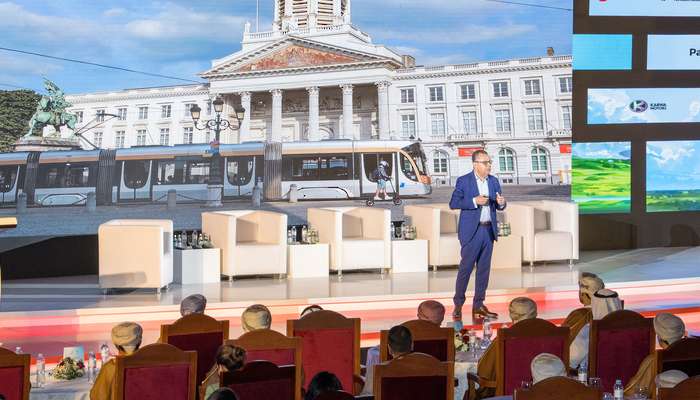Mwasalat recently launched the first electric bus in the Sultanate of Oman, marking a significant step towards sustainable public transportation in the region. The launch event, held in Salalah, was attended by prominent figures including Minister of Transport and Communications Engineer Saeed bin Hamoud Al Maawali and members of the International Union of Public Transport. The electric bus, equipped with advanced technology, has a capacity of 28 passengers and can travel at speeds of 70 to 130 kilometres per hour, making it ideal for urban use. The bus features a high-capacity lithium iron phosphate battery that ensures performance efficiency and sustainability, meeting international safety standards.
The conference surrounding the launch of the electric bus included four main sessions that focused on enhancing urban sustainability through public transportation in the Middle East and North Africa region, green technologies in the public transport sector, intelligent transportation systems, and the integration of public transport structures in line with global best practices. Additionally, Mwasalat signed cooperation programs with American company Odis and HICAP Middle East to develop sustainable self-driving air transport technology and remove carbon from the transportation fleet in Oman, respectively. These initiatives aim to further Mwasalat’s commitment to sustainability and explore green fuel options, such as hydrogen, for future transportation operations.
The launch of the electric bus and the accompanying conference reflect Mwasalat’s dedication to promoting sustainability on both national and international levels. By exchanging experiences, collaborating on innovative transportation solutions, and reducing the carbon footprint of its operations, Mwasalat is actively working towards improving the quality of life in the region. The participation of international specialists in the transportation sector at the conference further highlights the importance of incorporating modern technologies and smart systems to enhance public transportation policies and practices.
In addition to showcasing the capabilities of the electric bus, the conference delved into discussions on the role of public transportation in achieving environmental sustainability, reducing traffic congestion, and lowering pollution levels. By embracing green technologies, such as electric buses and hydrogen fuel cells, public transport systems can contribute to the development of green cities and healthier urban environments. The integration of intelligent transportation systems is also emphasized as a means to enhance operational efficiency and improve the overall passenger experience, aligning with global best practices in the sector.
As part of its sustainability strategy, Mwasalat continues to prioritize the development of innovative transportation solutions that align with modern trends and advancements in the sector. By signing cooperation agreements with industry partners, such as Odis and HICAP Middle East, Mwasalat aims to leverage expertise and technical knowledge to drive sustainable practices and reduce carbon emissions. These strategic partnerships underscore Mwasalat’s commitment to sustainability and its proactive approach in implementing tangible actions to address environmental challenges and promote eco-friendly transportation options.
Moving forward, Mwasalat’s initiatives in promoting sustainable public transportation solutions are set to make a significant impact in the region. By embracing technological advancements, fostering collaborations with industry leaders, and incorporating green technologies into its operations, Mwasalat is paving the way for a more environmentally conscious and efficient public transport system. The successful launch of the first electric bus in Oman signals a new era of sustainable transportation in the country, setting the stage for continued innovation and progress in the sector.





















